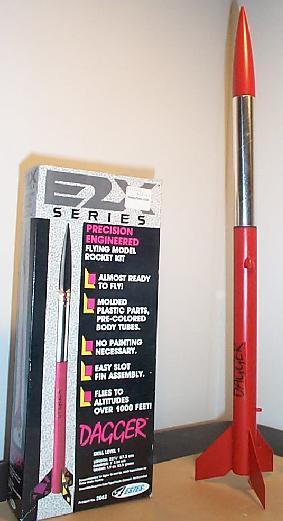| Construction Rating: | starstarstarstarstar_border |
| Flight Rating: | starstarstarstarstar_border |
| Overall Rating: | starstarstarstarstar_border |
| Manufacturer: | Estes  |
 Brief: The Dagger is an E2X skill level 1 kit from Estes and, a "cousin" to the Rampage and Bandit kits. It's a single stage payload rocket with parachute recovery.
Brief: The Dagger is an E2X skill level 1 kit from Estes and, a "cousin" to the Rampage and Bandit kits. It's a single stage payload rocket with parachute recovery.
Modifications:
Recovery system, as described below.
Construction:
The components consisted of:
- 1) bt-1090(1.09")x11" body tube
- 1) bt-1090(1.09")x6" payload tube
- 1) nc-1090 nose cone
- 1) plastic tube coupler
- 1) plastic shock cord mount with shock cord lock assembly
- 2) plastic launch lugs
- 3) plastic fins
- 3) plastic engine mount pieces
- 1) front engine ring
- 1) rear engine ring
- 1) paper engine mount sleeve
- 1) engine hook
- 1) plastic chute,shroud lines,tape rings,and elastic shock cord pack
- 1) set of pressure sensitive decals
The kit is packed in a nice cardboard box,rather than the typical plastic bag. The instructions were easy to follow and the illustrations were very helpful.
The engine mount assembly consists of a 3-part cage and 2 end caps with a paper sleeve inside.The engine hook is sandwiched between the sleeve and cage
The instructions called for the use of (tube -type) cement but I used CA throughout the process. I have noticed that Model cement has a tendency to distort plastic parts and can get brittle over time.
There was a very small amount of flash that needed cleaning up, not a bad mold job at all, but something to keep an eye out for when assembling any plastic parts together. The overall fit of parts was very good.
The sustainer tube comes pre-slotted and has corresponding holes for the (2) launch lugs and the shock cord mount. Attention should be made to the alignment of the engine mount assembly inside the body tube. I dry fitted a fin thru the slot immediately after inserting the glued motor mount to make sure the alignment was correct. The launch lug holes must be aligned with the holes in the sustainer at the same time. I encountered no problem and the fit was perfect.
Next, glue is applied to the fins and a template is provided to check alignment The launch lugs are simply glued in also. Care should be taken in aligning the 2 launch lugs as they can easily rotate in the hole before the glue sets. Aligning them by "eye" is good enough.
A knot is tied in the end of the shock cord and the shock cord is than fed thru the shock cord mount. The shock cord mount is then inserted into a hole in the body tube from the outside and a plastic clip is glued and inserted into the body tube and forks over the shock cord mount.
This proved to be a little tricky because its hard to reach thru the small body tube to align the clip, but, with a little effort, it went together fine. I only used model cement on this part because I didn't want my finger attached to the rocket.
I substituted a 6" piece of Kevlar string for the shock cord and than tied a 18" piece of sewing elastic to the other end if the string. I than glued the payload section to the nose
The final building step is to cut out and assemble the chute and attaching it to the bottom of the coupler on the payload section.
Finishing:
The kit comes pre-painted with a pink sustainer tube, a silver payload tube and black fins and black nosecone. The decals are yellow, pink and black.
The overall scheme didn't appeal to me, so I opted to paint everything red and leave the silver payload tube unpainted. I did use the 2 "Dagger" decals.
The final product ended up looking very nice and I applied a thin coat of Future floor wax just to gloss it up a bit and blend the decals in a little better.
Construction Rating: 4 out of 5
Flight:
The finished rocket seemed to be very sturdy so I decided to use the highest rated motor (C6-5) for my first three flights. The motor hook fit well and held the motors firmly.
Each time I used 3 pieces of wadding. I cut the spill-hole from the chute and applied some baby powder before folding and inserting the chute.
I did find the payload adapter to be a little loose, so I applied a small amount of tape to the adapter at the launch site. I plan to wick some CA onto the inside of the sustainer tube for strength, so it will probably not need the tape afterwards.
I was impressed with the way the rocket "snapped" off the pad. All three flight were pretty straight and apogee was around 1000 ft. The chute seemed to deploy very close to appogee.
Recovery:
The spill hole was definitely a must even on the windless day I launched.
The finished rocket is light and weighed out exactly to Estes claim of 1.9 ounce.
The finished rocket is sturdy enough to handle a fast decent landing. On a windy day I would probably reef the chute as well as use the spill hole.
I wish Estes would use the Quest type of shock cord system, (as I did) and not be so stingy with the shock cord length.
Flight Rating: 4 out of 5
Summary:
Pros- Easy to build, good overall design, strong, and a good flyer.
Cons- typical (too short) Estes shock cord, prone to burn in half very easily.
Overall Rating: 4 out of 5
 |
 |
Flights
Sponsored Ads
 |
 |











